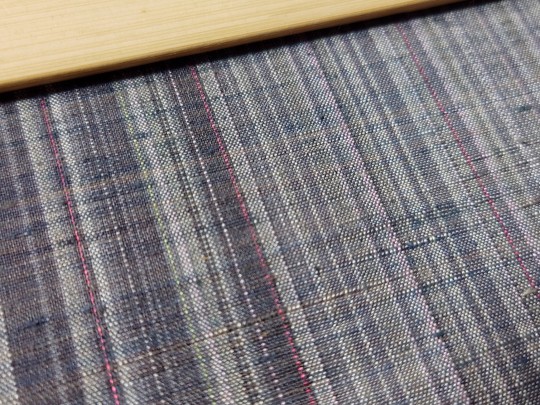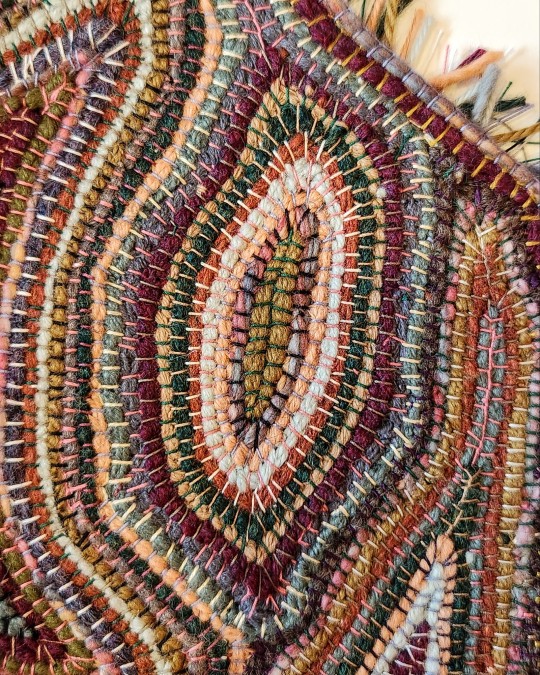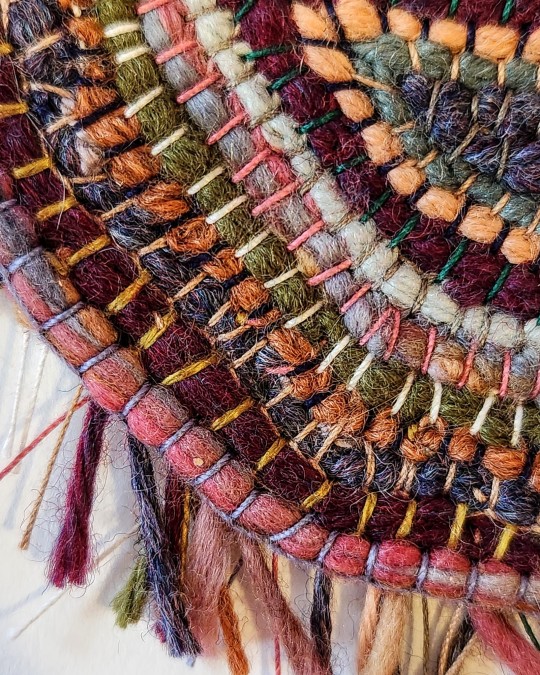#fiber
Text

mariko kusumoto
12K notes
·
View notes
Text

新しい着尺を織りはじめました。
I've just started to weave a new kimono fabric.
5K notes
·
View notes
Text

Mother and newborn
#goats#stonywoods farm#mohair#angora goat#farm#furry#curly#farm animals#cute baby goat#angora#animals#goat#fiber#fibre#baby animals#baby goats#goats in clothes#goats in coats#all dressed up#colored angora goats#baby colored angora goat#baby animal#baby angora goats#angora goats#mohair on the hoof
16K notes
·
View notes
Text






This piece brings me so much joy 🤗
Hand made by me, mushrooms made by me with polymer clay, I also stitched in the beading by hand as well.
#weaving#yarn#art#loom weaving#fiber#fiber arts#3d art#cottagecore#yarnweaving#crafts#fairy#forest#mushrooms#polymer clay
3K notes
·
View notes
Text

アーケードマネキネコ
3K notes
·
View notes
Text

In Delicate Detail, Ester Magnusson Meticulously Fashions a Human Skull From Lace
1K notes
·
View notes
Text






23-29. Mixed fibers.
Finally came back to this one and finished filling it in! An interesting experiment- I love the interplay of colors, but filling in all the space instead of leaving open spots adds a lot of time. It's also hard to focus on simply filling in for so long, which is why I took a break. I do like how it came out, though!
2K notes
·
View notes
Text
Utah’s getting some of America’s best broadband

TOMORROW (May 17), I'm at the INTERNET ARCHIVE in SAN FRANCISCO to keynote the 10th anniversary of the AUTHORS ALLIANCE.

Residents of 21 cities in Utah have access to some of the fastest, most competitively priced broadband in the country, at speeds up to 10gb/s and prices as low as $75/month. It's uncapped, and the connections are symmetrical: perfect for uploading and downloading. And it's all thanks to the government.
This broadband service is, of course, delivered via fiber optic cable. Of course it is. Fiber is vastly superior to all other forms of broadband delivery, including satellites, but also cable and DSL. Fiber caps out at 100tb/s, while cable caps out at 50gb/s – that is, fiber is 1,000 times faster:
https://www.eff.org/deeplinks/2019/10/why-fiber-vastly-superior-cable-and-5g
Despite the obvious superiority of fiber, America has been very slow to adopt it. Our monopolistic carriers act as though pulling fiber to our homes is an impossible challenge. All those wires that currently go to your house, from power-lines to copper phone-lines, are relics of a mysterious, fallen civilization and its long-lost arts. Apparently we could no more get a new wire to your house than we could build the pyramids using only hand-tools.
In a sense, the people who say we can't pull wires anymore are right: these are relics of a lost civilization. Specifically, electrification and later, universal telephone service was accomplished through massive federal grants under the New Deal – grants that were typically made to either local governments or non-profit co-operatives who got everyone in town connected to these essential modern utilities.
Today – thanks to decades of neoliberalism and its dogmatic insistence that governments can't do anything and shouldn't try, lest they break the fragile equilibrium of the market – we have lost much of the public capacity that our grandparents took for granted. But in the isolated pockets where this capacity lives on, amazing things happen.
Since 2015, residents of Jackson County, KY – one of the poorest counties in America – have enjoyed some of the country's fastest, cheapest, most reliable broadband. The desperately poor Appalachian county is home to a rural telephone co-op, which grew out of its rural electrification co-op, and it used a combination of federal grants and local capacity to bring fiber to every home in the county, traversing dangerous mountain passes with a mule named "Ole Bub" to reach the most remote homes. The result was an immediately economic uplift for the community, and in the longer term, the county had reliable and effective broadband during the covid lockdowns:
https://www.newyorker.com/tech/annals-of-technology/the-one-traffic-light-town-with-some-of-the-fastest-internet-in-the-us
Contrast this with places where the private sector has the only say over who gets broadband, at what speed, and at what price. America is full of broadband deserts – deserts that strand our poorest people. Even in the hearts of our largest densest cities, whole neighborhoods can't get any broadband. You won't be surprised to learn that these are the neighborhoods that were historically redlined, and that the people who live in them are Black and brown, and also live with some of the highest levels of pollution and its attendant sicknesses:
https://pluralistic.net/2021/06/10/flicc/#digital-divide
These places are not set up for success under the best of circumstances, and during the lockdowns, they suffered terribly. You think your kid found it hard to go to Zoom school? Imagine what life was like for kids who attended remote learning while sitting on the baking tarmac in a Taco Bell parking lot, using its free wifi:
https://www.wsws.org/en/articles/2020/09/02/elem-s02.html
ISPs loathe competition. They divide up the country into exclusive territories like the Pope dividing up the "new world" and do not trouble one another by trying to sell to customers outside of "their" turf. When Frontier – one of the worst of America's terrible ISPs – went bankrupt, we got to see their books, and we learned two important facts:
The company booked one million customers who had no alternative as an asset, because they would pay more for slower broadband, and Frontier could save a fortune by skipping maintenance, and charging these customers for broadband even through multi-day outages; and
Frontier knew that it could make a billion dollars in profit over a decade by investing in fiber build-out, but it chose not to, because stock analysts will downrank any carrier that made capital investments that took more than five years to mature. Because Frontier's execs were paid primarily in stock, they chose to strand their customers with aging copper connections and to leave a billion dollars sitting on the table, so that their personal net worth didn't suffer a temporary downturn:
https://www.eff.org/deeplinks/2020/04/frontiers-bankruptcy-reveals-cynical-choice-deny-profitable-fiber-millions
ISPs maintain the weirdest position: that a) only the private sector can deliver broadband effectively, but b) to do so, they'll need massive, unsupervised, no-strings-attached government handouts. For years, America went along with this improbable scheme, which is why Trump's FCC chairman Ajit Pai gave the carriers $45 billion in public funds to string slow, 19th-century-style copper lines across rural America:
https://pluralistic.net/2022/02/27/all-broadband-politics-are-local/
Now, this is obviously untrue, and people keep figuring out that publicly provisioned broadband is the only way for America to get the same standard of broadband connectivity that our cousins in other high-income nations enjoy. In order to thwart the public's will, the cable and telco lobbyists joined ALEC, the far-right, corporatist lobbying shop, and drafted "model legislation" banning cities and counties from providing broadband, even in places the carriers chose not to serve:
https://pluralistic.net/2023/03/19/culture-war-bullshit-stole-your-broadband/
Red states across America adopted these rules, and legislators sold this to their base by saying that this was just "keeping the government out of their internet" (even as every carrier relied on an exclusive, government-granted territorial charter, often with massive government subsidies).
ALEC didn't target red states exclusively because they had pliable, bribable conservative lawmakers. Red states trend rural, and rural places are the most likely sites for public fiber. Partly, that's because low-density areas are harder to make a business case for, but also because these are also the places that got electricity and telephone through New Deal co-ops, which are often still in place.
Just about the only places in America where people like their internet service are the 450+ small towns where the local government provides fiber. These places vote solidly Republican, and it was their beloved conservative lawmakers whom ALEC targeted to enact laws banning their equally beloved fiber – keep voting for Christmas, turkeys, and see where it gets you:
https://communitynets.org/content/community-network-map
But spare a little sympathy for the conservative movement here. The fact that reality has a pronounced leftist bias must be really frustrating for the ideological project of insisting that anything the market can't provide is literally impossible.
Which brings me back to Utah, a red state with a Republican governor and legislature, and a national leader in passing unconstitutional, unhinged, unworkable legislation as part of an elaborate culture war kabuki:
https://www.npr.org/2023/03/24/1165975112/utah-passes-an-age-verification-law-for-anyone-using-social-media
For more than two decades, a coalition of 21 cities in Utah have been building out municipal fiber. The consortium calls itself UTOPIA: "Utah Telecommunication Open Infrastructure Agency":
https://www.utopiafiber.com/faqs/
UTOPIA pursues a hybrid model: they run "open access" fiber and then let anyone offer service over it. This can deliver the best of both worlds: publicly provisioned, blazing-fast fiber to your home, but with service provided by your choice of competing carriers. That means that if Moms for Liberty captures you local government, you're not captive to their ideas about what sites your ISP should block.
As Karl Bode writes for Techdirt, Utahns in UTOPIA regions have their choice of 18 carriers, and competition has driven down prices and increased speeds. Want uncapped 1gb fiber? That's $75/month. Want 10gb fiber? That's $150:
https://www.techdirt.com/2024/05/15/utah-locals-are-getting-cheap-10-gbps-fiber-thanks-to-local-governments/
UTOPIA's path to glory wasn't an easy one. The dismal telco monopolists Qwest and Lumen sued to put them out of business, delaying the rollout by years:
https://www.deseret.com/2005/7/22/19903471/utopia-responds-to-qwest-lawsuit/
UTOPIA has been profitable and self-sustaining for over 15 years and shows no sign of slowing. But 17 states still ban any attempt at this.
Keeping up such an obviously bad policy requires a steady stream of distractions and lies. The "government broadband doesn't work" lie has worn thin, so we've gotten a string of new lies about wireless service, insisting that fiber is obviated by point-to-point microwave relays, or 5g, or satellite service.
There's plenty of places where these services make sense. You're not going to be able to use fiber in a moving car, so yeah, you're going to want 5g (and those 5g towers are going to need to be connected to each other with fiber). Microwave relay service can fill the gap until fiber can be brought in, and it's great for temporary sites (especially in places where it doesn't rain, because rain, clouds, leaves and other obstructions are deadly for microwave relays). Satellite can make sense for an RV or a boat or remote scientific station.
But wireless services are orders of magnitude slower than fiber. With satellite service, you share your bandwidth with an entire region or even a state. If there's only a couple of users in your satellite's footprint, you might get great service, but when your carrier adds a thousand more customers, your connection is sliced into a thousand pieces.
That's also true for everyone sharing your fiber trunk, but the difference is that your fiber trunk supports speeds that are tens of thousands of times faster than the maximum speeds we can put through freespace electromagnetic spectrum. If we need more fiber capacity, we can just fish a new strand of fiber through the conduit. And while you can increase the capacity of wireless by increasing your power and bandwidth, at a certain point you start pump so much EM into the air that birds start falling out of the sky.
Every wireless device in a region shares the same electromagnetic spectrum, and we are only issued one such spectrum per universe. Each strand of fiber, by contrast, has its own little pocket universe, containing a subset of that spectrum.
Despite all its disadvantages, satellite broadband has one distinct advantage, at least from an investor's perspective: it can be monopolized. Just as we only have one electromagnetic spectrum, we also only have one sky, and the satellite density needed to sustain a colorably fast broadband speed pushes the limit of that shared sky:
https://spacenews.com/starlink-vs-the-astronomers/
Private investors love monopoly telecoms providers, because, like pre-bankruptcy Frontier, they are too big to care. Back in 2021, Altice – the fourth-largest cable operator in America – announced that it was slashing its broadband speeds, to be "in line with other ISPs":
https://pluralistic.net/2021/06/27/immortan-altice/#broadband-is-a-human-right
In other words: "We've figured out that our competitors are so much worse than we are that we are deliberately degrading our service because we know you will still pay us the same for less."
This is why corporate shills and pro-monopolists prefer satellite to municipal fiber. Sure, it's orders of magnitude slower than fiber. Sure, it costs subscribers far more. Sure, it's less reliable. But boy oh boy is it profitable.
The thing is, reality has a pronounced leftist bias. No amount of market magic will conjure up new electromagnetic spectra that will allow satellite to attain parity with fiber. Physics hates Starlink.
Yeah, I'm talking about Starlink. Of course I am. Elon Musk basically claims that his business genius can triumph over physics itself.
That's not the only vast, impersonal, implacable force that Musk claims he can best with his incredible reality-distortion field. Musk also claims that he can somehow add so many cars to the road that he will end traffic – in other words, he will best geometry too:
https://pluralistic.net/2022/10/09/herbies-revenge/#100-billion-here-100-billion-there-pretty-soon-youre-talking-real-money
Geometry hates Tesla, and physics hates Starlink. Reality has a leftist bias. The future is fiber, and public transit. These are both vastly preferable, more efficient, safer, more reliable and more plausible than satellite and private vehicles. Their only disadvantage is that they fail to give an easily gulled, thin-skinned compulsive liar more power over billions of people. That's a disadvantage I can live with.

If you'd like an essay-formatted version of this post to read or share, here's a link to it on pluralistic.net, my surveillance-free, ad-free, tracker-free blog:
https://pluralistic.net/2024/05/16/symmetrical-10gb-for-119/#utopia

Image:
4028mdk09 (modified)
https://commons.wikimedia.org/wiki/File:Rote_LED_Fiberglasleuchte.JPG
CC BY-SA 3.0
https://creativecommons.org/licenses/by-sa/3.0/deed.en
296 notes
·
View notes
Text
Fiber is the craziest thing. Like it's wild how noticeably better my shits are when I get a decent amount of fiber. Like I have butter shits. Like that one ABBA boyband song or whatever where they say they're smooth like butter like a bank robber undercover.
148 notes
·
View notes
Text




Well Nikki decided to drop all her fiber at once this year! It took about 3 days doing one hour sessions to comb this all out but it's nice to be done! I got a nice thirteen gallon trashbag worth of fleece off of her, wich for it's size is only 10.2 ounces of fleece! So next time you look at cashmere and think damn thats expensive just remember that the average cashmere goat only produces around 5oz in a year (also localy produced fiber is always a better buy ;)) So good job Nikki! I'm excited to process this to sell this year, though I'm not sure if i should process it fully into yarn or leave it as cloud for others to spin. Lots of decisions! I have four other goats to comb out and I'm excited to see how their fleeces turn out this year since Nikki's is looking so lovely!
#goats#goat#cashmere goat#goatblr#farm animals#farmblr#nikki#fiber goats#fiber stuff#fiber arts#cashmere#fiber#farming
201 notes
·
View notes
Text

なあ…ねこや…
うち仕事中やねん
重いねん
まあ慣れたけどな…?
(膝で管巻きのペダル踏んでます)
Hey Cat... I'm working as you know,and you're heavy as you know... although it's always, our daily lives......(I'm pushing on the pedal of the bobbin winder by my knee...)
3K notes
·
View notes
Text
Not even a week old
#goats#stonywoods farm#mohair#angora goat#furry#farm#curly#farm animals#cute baby goat#angora#animals#fiber#fibre#goat#baby animals#baby goats#cute baby#cute animals#baby colored angora goat
2K notes
·
View notes
Text







I haven’t made much lately that I like, but this one was too cute. Mushie paradise! 🍄🟫
#weaving#yarn#art#loom weaving#fiber#fiber arts#3d art#cottagecore#yarnweaving#crafts#landscape#forest#witchy#mushrooms#mushies#forest aesthetic#polymer clay
267 notes
·
View notes
Text

マネキネコベル
#fiber art#rug tufting#maneki neko#lucky cat#kidwave#kidcore#fairy kei#decora#2022#artists on tumblr#fiber
9K notes
·
View notes
Text



Shishi San’s Vibrant Tufted Sculptures Celebrate the Colorful Motifs of Chinese Vases
2K notes
·
View notes
Photo



It's #wipwednesday! What are you working on this week? 👋🌟💝
Next free blanket on my hook! This is the Triple Interlocking Block Stitch, video on my YouTube channel! Tutorial here! 💖
Link to my blog/website: https://crochetml.com/
https://crochetml.com/free-crochet-patterns/
Check out the tiktok here!
#yarn#fiber#fiber art#fiber arts#fiber artists#fiber artist#crochet#crocheting#crocheted#crochet pattern#crochet patterns#free crochet pattern#free crochet tutorial#free crochet patterns#free crochet tutorials#crochet tutorial#crochet tutorials#video#videos#tiktok#tiktoks#diy#how to#crafts#crafting#crafty#craft#wip#wips#work in progress
878 notes
·
View notes